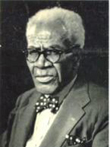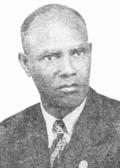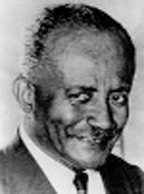History This Week
By Hazel Woolford
The political leaders and trade unionists in British Guiana, and the West Indies had campaigned for the political union of the British West Indian colonies since the 1920s. They wanted West Indian Federation and ultimately self-government. These leaders included, Hubert Nathaniel Critchlow and Theophilus Marryshow. In fact, Marryshow would later be known as the ‘Father of Federation’.

In 1938, the delegates of the British Guiana and British West Indies Labour Congress, held their first real regional and political meeting. It was at this conference that Marryshow, made the statement: ‘Federation or Disintegrate.’ The delegates at the conference demanded self government with adult suffrage in the West Indies Colonies. They also recommended that the colonial governments institute the following:
a) A privately elected legislative;
b) Qualifications for elected members to be solely on an educational basis;
c) An executive council to be elected by the members of the legislative, and to be responsible to the legislative;
d) The Legislative Council to elect its own President;
e) The constitutional position and the relationships of the Governor with the legislative to be similar to that of the King, in order to exercise the King’s prerogative on the advice of the Executive.
In the aftermath of the Second World War, the British government was not unwilling to encourage the West Indian colonies to assume control of administering their states. The Guianese and West Indian soldiers and intellectuals who had returned to the colonies, after experiencing the effects of the war, also promoted the idea of decolonisation. However, in the 1940s, the discussion on the formation of a West Indian Federation intensified.
During 1945, A.A. Dhorme participated in putting forward a programme for the

Federation of the West Indies and British Guiana. This was supported by Critchlow who presented a resolution to the Legislative Council on September 5, 1945, for West Indian Federation. He noted that this proposal had been discussed by the British Guiana Labour Union and the West Indies Labour Congress since 1926 in England, and in Guiana in 1944. He argued that there were several benefits, which would be derived from federation between British Guiana and West Indies. He contended that if the colonies were united, they would achieve self government earlier, and secondly that British Guiana would be populated by Jamaicans and Barbadians, who would assist in the development of the colony. It was his view that Guiana would find a ready market for her rice, cattle, and other produce in the West Indian colonies.
Critchlow stated that political federation would result in the establishment of the West Indies University, an interchange of civil servants between Guiana and the West Indies, and the formation of a Customs Union. Like several persons who argued in favour of federation, Critchlow emphasised that the union would achieve economic stability and the possibility of the unification of such public services as education and health. He queried:

The great nations have got (sic) together in order to win the war.
Why is it that we cannot get together with the West Indies in order to secure better social and economic conditions for this colony as a whole?
As early as 1919, the Guianese and West Indian Governments had begun to promote federal development. They produced a memorandum, with respect to inter West Indies Trade. It dealt with the various imports into Barbados such as rice, coffee, cocoa, copra, from the various West Indian islands, and rice from British Guiana, and coffee from Trinidad.
During 1945, the Georgetown Chambers of Commerce appointed a committee to discuss the proposal of a customs union, and federation of the British West Indies. This committee also had to examine the memorandum from the President of the Incorporated Chambers of Commerce, with respect to inter West Indies trade in local foodstuffs.
It was also during 1945 that, the legislative council of Guiana approved in principle the establishment of a unified currency note for the British West Indies and British Guiana to replace separate currency notes which would be issued in denominations both in dollars, and the equivalent in sterling at the fixed value of four shillings, and two pence to the dollar. They also approved of the unified currency note issued, being controlled by a joint local board, constituted by the representatives of the colonies concerned.
By 1947, it was announced in the legislative council, that the Secretary of State had approved of the proposal for the introduction of a unified currency for the British West Indies (Eastern Caribbean) and British Guiana.
A preparatory committee was appointed to study the necessary legislation, and to have the proposal implemented. The committee consisted of the acting Financing Secretary of Trinidad, Mr. R. B. Skinner; the Treasurers of the Leeward and the Windward Islands, Messrs. E.A. Thompson and L. Coots L’Artigue respectively, H.A. Luke of Barbados, and E.F. Mc David of British Guiana.
Thus, in 1947, the Guianese public had also become involved in the discussion of federation. In a letter to the press, R.B.O. Hart stated that he considered himself a representative of the Guianese students in England, when he said that he was in favour of West Indian Federation, because of the economic benefits. In fact, many of the Guianese who supported West Indian Integration were persuaded by the potential cultural and economic benefits for the colony. While those who opposed the political fusion argued, that it would be a retrograde step, and would only benefit the colonial power. They even suggested that it was Mr. Greech Jones, the Colonial Office Representative, who had influenced the decision to form the West Indian Federation.
There were other auto-federationists, who were very cautious about a political union, because of the ethnic factor. Except for British Guiana, Trinidad had the highest percentage of Indians. But the majority of persons, who were opposed to Federation, did not consider it practical politics, although they did not object to cooperating with the West Indian Islands, at an economic level. Like Alexander Bustamante of Jamaica, they considered federation an imposition. There was also the constant fear that the larger colonies would have to shoulder the financial burdens of the smaller states. However, as late as 1955, while recognizing that ‘Big Business’, was opposed to federation, Gertrude Collins had appealed to the anti-federationists by pointing out:
It has been said that people from the West Indian Islands will be dumped into this country and will cause greater depression among the people of the colony, but I would like to say that with the help of people from the West Indies, federation will bring about the economic progress of the people of British Guiana.
The Caribbean Labour Congress led the campaign for the formation of a political union. This was emphasised at the Standing Closer Association of the British Caribbean Territories Conference, in Montego Bay, Jamaica in 1947. However, Critchlow was the only Guianese Labour leader who accepted the proposal for a Closer Union of Federation of the British colonies in the Caribbean.
One of the persons, who stridently promoted federation in 1947, was Mr. Grantley Adams. He was the President of the Caribbean Labour Congress (CLC). He insisted that CLC wanted federation immediately with Dominion status. The Caribbean Labour Congress wanted a federal constitution similar to what Australia had before 1931. It recommended decentralisation, with the appointment of a Governor General, local governors, a single-chamber legislative federally, a federal cabinet with ministerial authority, and independent self government for each unit.
The CLC’s arguments for federalism were quite similar to their pro federation Guianese counterparts. The organisation emphasised that the political union was compulsory because the countries were too small to negotiate effectively at the international level. The CLC also suggested that specific sources of taxation had to be written into the constitution, and that income tax and customs be linked federally.
Grantley Adams argued that without federation, West Indian and Guianese politicians would not achieve the desired objectives of:
1. sound economic foundation or progress;
2. secure representation internationally and;
3. secure better prices for their products, unless the markets were protected.
On the other hand in 1947, Theophilus Lee of the Cosmopolitan Union cautioned that in order for Guiana to become a unit of federation, there should be:
1. some degree of parity in the institutional status of the component unit of the federation.
2. a clear policy regarding the election of representatives to the federal council.
3. the redistribution of the population of the various components of the federation.
4. the Judicature should be under on Chief Justice.
A. Edun of the M.P.C.A. was also strongly opposed to federation. He claimed that if British Guiana supported the political union, it would be “like a cat putting its head in a salmon tin”, because Federation was against the interest of the common man. He had thought that the union would delay the progress of Guiana and would mean increasing the burden of taxation in the countries of federation. However, he supported self government, and contended that countries would not lose their ‘individuality or power to manage their own affairs’.
During the 1950s, more politicians joined the campaign for a West Indian Federation but British Guiana did not participate. Forbes Burnham tabled a motion in the Legislative, requesting British Guiana to join the Federation, but this was rejected. In 1962, the political union failed, and each colony sought its own political independence.
While there was not another serious attempt at the formation of a political union, politicians did not give up on establishing a regional grouping. This was realized on July 4, 1973 when the Prime Ministers of Barbados, Jamaica, Guyana and Trinidad and Tobago signed the Treaty of Chaguaramas. This gave birth to the Caribbean Community (CARICOM). Prime Minister Eric Williams was the architect of this union.





